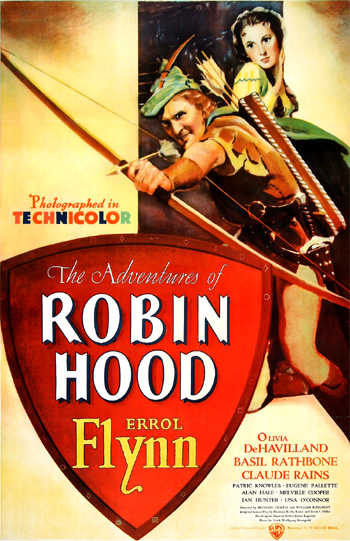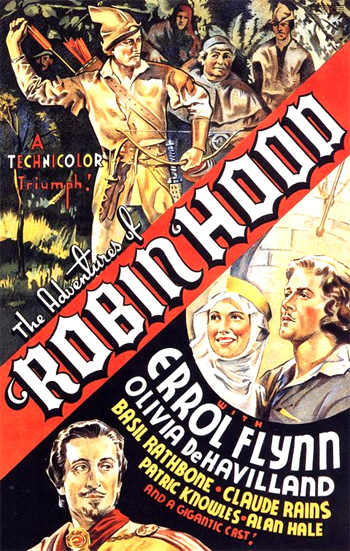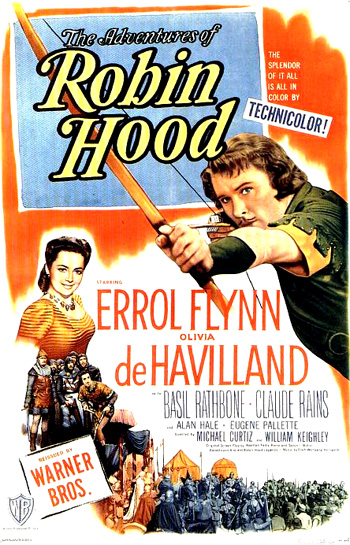Background
  The
Adventures of Robin Hood (1938) is one of the greatest, most
colorful costume dramas, swashbucklers, and romantically-tinged
adventure films in film history. After the icy restrictions placed
on the film industry following the establishment of the Production
Code Administration (Breen Office) in the mid 1930s, Warner Bros.
Studios decided to find relief from censorship by bringing about
a renaissance of the historical-costume adventure film, with swordplay,
sweeping action, and romantic charm. The
Adventures of Robin Hood (1938) is one of the greatest, most
colorful costume dramas, swashbucklers, and romantically-tinged
adventure films in film history. After the icy restrictions placed
on the film industry following the establishment of the Production
Code Administration (Breen Office) in the mid 1930s, Warner Bros.
Studios decided to find relief from censorship by bringing about
a renaissance of the historical-costume adventure film, with swordplay,
sweeping action, and romantic charm.
Although its main star had portrayed a similar role
in Captain Blood (1935) with the same dynamic director, Michael
Curtiz, this film established 29 year-old actor Errol Flynn as a
dashing, gallant, romantic, impudent but light-hearted, athletic
legendary adventure hero - it is the Errol Flynn picture and the definitive
film portraying the Robin Hood legend. [This was another of the twelve
films that Curtiz ultimately directed with Flynn as star.]
Director
Michael Curtiz was brought in by studio executives to quickly replace
William Keighley when incapacitated by illness, according to Variety,
while other sources claimed that Curtiz was chosen to create more
engaging, impactful, fast-moving and action-oriented content when
Keighley couldn't meet the tight production schedule. Both directors
received screen credit for their work. [William Keighley had previously
directed top-billed Flynn in the Warner Bros' costume drama The
Prince and the Pauper (1937) a year earlier.]
It expertly tells the story of the heroic Robin and
his Sherwood Forest followers, who saved England from royal treachery
by scheming nobles during the absence of the crusading and captured-ransomed
King Richard the Lion-Hearted. And it tells the fairy-tale romance
with nostalgic chivalry, colorful pageantry, simple righteousness
triumphant over villainous and evil might, and spectacular action.
There were at least six silent era attempts at the
story. The Reginald de Koven-Harry B. Smith light opera version of Robin
Hood was originally presented in 1890. And Douglas Fairbanks
starred as the infamous outlaw hero and Wallace Beery as Richard
the Lion-Hearted in an early silent version of the film directed
by Allan Dwan - Robin Hood (1922), reportedly the most expensive
film made up to that time (at $1.6 - 2 million). In addition to his
daring stunt work (sliding down a drapery, engaging in archery and
swordsmanship, and other acrobatic feats), Fairbanks wrote the screenplay
(with pseudonym Elton Thomas) for the fast moving, epic silent film
filled with medieval pageantry.
The 1938 Warner Bros. film is expensively mounted
(at $2 million, it was the studio's largest budgeted film), and beautifully
photographed in glorious and brilliant, three-strip Technicolor (Warners'
first use of color) by cinematographers Sol Polito and Tony Gaudio,
especially in the Sherwood Forest sequence [filmed in Bidwell Park
in Chico, California] and other scenes of costumed pageantry. [During
preliminary plans for the film, it was originally expected that James
Cagney would star as the legendary outlaw and contract player Guy
Kibbee would play Friar Tuck.]
The spectacle includes superb casting of memorable
characters, a light-hearted, but spirited story, exciting dueling
and action scenes requiring extensive stunt work, and the ideal love
team of de Havilland and gallant Flynn with their witty and tender
romantic scenes together. [It was their third of eight films together
- the first two were Captain Blood (1935) and The Charge
of the Light Brigade (1936) - and this was the first of their
pairings in color.] Flynn did most of his own dueling and other action
stunts except for the expert archery shooting, and was coached by
fencing master Fred Cavens.
Oscar-winning Erich Wolfgang Korngold (who won his
second award) created the richly orchestrated, lush score that effectively
provided the musical backdrop for the action and the rich settings,
and the literate screenplay was co-written by contract writer Norman
Reilly Raine (who won the Academy Award in 1938 for the prestigious The
Life of Emile Zola (1937)) and Seton I. Miller (who was co-author
of The Sea Hawk (1940), another Flynn swashbuckler).
The film was nominated for four Academy Awards: Best
Interior Direction (Carl J. Weyl), Best Original Score (Erich Wolfgang
Korngold), Best Film Editing (Ralph Dawson), and Best Picture, and
lost only its Best Picture recognition to Frank Capra's You Can't
Take It With You (1938).
Disney produced two Robin Hood versions: The Story
of Robin Hood and his Merrie Men (1952) (Disney's second made-in-Britain
production) and the animated Robin Hood (1973). And Hammer
Studios produced three Robin Hood movies in the 1950s and 1960s: Men
of Sherwood Forest (1957), Sword of Sherwood Forest (1960),
and A Challenge for Robin Hood (1968). The 1938 film had
a sequel of sorts, Robin and Marian (1976), with Sean Connery
and Audrey Hepburn as middle-aged lovers. And Kevin Costner starred
as the title character in Kevin Reynolds' Robin Hood: Prince
of Thieves (1991).
Plot Synopsis
During the titles and credits, the viewer is informed
that the quasi-historical story of the rogue outlaw is "Based
Upon Ancient Robin Hood Legends," although the film also borrowed
from old English ballads and Sir Walter Scott's 1819 novel Ivanhoe,
with its emphasis on the oppressive treatment of the Saxons by the
Norman knights.
[Historically, Richard left England in late 1189,
continued onto the Holy Land in mid 1190, was seized by Austria
in late 1192, and returned to England (in a state processional
acknowledged publicly) in March, 1194, when Prince John was in
France (or Normandy). The Prince's Nottingham Castle was seized
by King Richard himself while John was still absent.]
 The film opens with a lengthy historical prologue,
setting the film's time period in late 12th century England: The film opens with a lengthy historical prologue,
setting the film's time period in late 12th century England:
In the year of Our Lord 1191, when Richard, the Lion-Heart,
set forth to drive the infidels from the Holy Land, he gave the
Regency of his Kingdom to his trusted friend, Longchamp, instead
of to his treacherous brother, Prince John. Bitterly resentful,
John hoped for some disaster to befall Richard so that he, with
the help of the Norman barons, might seize the throne for himself.
And then on a luckless day for the Saxons...
A proclamation is read by a town crier to a crowd that
news has arrived from Vienna that King Richard the Lion Hearted (Ian
Hunter) has been captured in Austria by Emperor Leopold and held
for ransom while returning from the Third Crusade in the Holy Land.
The news at Nottingham Castle is welcomed by Richard's brother, the
sly, scheming, evil and despotic Prince John (Claude Rains) - who
has usurped power and declared himself Regent of England (heir-apparent
to the British throne) by self-appointment during the King's absence
and imprisonment.
[Note: The motion picture, beyond its entertainment
value, also served warnings against oppression toward the dictators
of the late 1930s - counterparts of Prince John.]
Ruthless
Sir Guy of Gisbourne (Basil Rathbone) - the ruler of the city of
Nottingham, the ineffectual High Sheriff of Nottingham (Melville
Cooper), and other ruling Norman nobles and knights in the upper
class (with Prince John) plot to brutally subjugate and overtax the
Saxons (pretending that the money will pay the King's ransom) and
take over power in the kingdom.
In Sherwood Forest located near the city of Nottingham
[filmed in Chico, California's Bidwell Park], Sir Guy and a group
of knights discover Much the Miller's Son (Herbert Mundin) poaching
a royal deer, an offense punishable by death. When asked if he knows "it's
death to kill the King's deer," Much replies indignantly, denouncing
their tyranny:
Yes, and death from hunger if I don't, thanks to
you and the rest of you Norman cutthroats at Nottingham Castle...You
can beat and starve our Saxons now, but when King Richard escapes,
he'll take you by the scruff of the neck and fling you into the
sea.
Gisbourne moves to strike Much with his mace, but
the weapon is shot out of his hand by an arrow out of the bow of
the dashing, athletic, and heroic Sir Robin of Locksley (Errol Flynn).
Robin, wearing a green outfit with brown woodman's cap and hunting
boots had viewed the entire encounter with partner Will Scarlet (Patric
Knowles). Gisbourne also threatens Robin with the death penalty for
opposing him. Robin asks: "Are there no exceptions?" as
he draws a second arrow and aims it at Gisbourne's heart, forcing
him to back down and gallop off with his party of knights. Grateful
for having his life saved, Much pledges himself to Robin's service:
From this day on, I'll follow only you. Why there
isn't a poor Saxon in all of Nottinghamshire that doesn't know
and bless Sir Robin of Locksley. Take me as your servant. Why in
all the forest, there isn't a hunter as good as me. I ask no pay,
just to follow you.
To introduce the next memorable scene, another description:
The great cold hall of Nottingham Castle, the stronghold
of Sir Guy Gisbourne, knew an unaccustomed warmth this night, for
Prince John and his friends were met to celebrate a promising future.
Prince
John holds an extravagant evening banquet at Nottingham Castle for
the ruling Norman barons that are assisting him in his conspiracy.
Prince John speaks to the gathered throng:
Well, this is what we Normans like - good food, good
company, and a beautiful woman to flatter me.
At the head table with Prince John is the lovely Norman
ward of King Richard (before he left on the Third Crusade), the seemingly
demure and innocent, yet regal Lady Marian Fitzwalter (Olivia de
Havilland). She is an unsuitable match for an arranged marriage with
Gisbourne. With tongue-in-cheek humor, the matchmaker Prince John
suggests Gisbourne for her love interest, but she graciously defers:
Prince John: Was it worthwhile, coming with me from
London to see what stout fellows our Nottingham friends are? Take
Sir Guy. He's from London, one of our most renowned defenders of
the realm.
Marian: Must I take him, your Highness?
Prince: Why, you like him, don't you?
Marian: Well, he's a Norman, of course.
Prince: Is that the only reason for liking him?
Marian: Isn't that reason enough for a royal ward...?
Prince: Nay, I not force you, my lady. But he's our most powerful
friend in these shires. And he's already in love with you. If I could
promise him marriage to a royal ward, it might help my plans.
Marian: Perhaps when I know him better.
Prince: Of course. You're a very wise young woman.
 Without real concern or sincerity, the Prince asks
everyone: "Any more objections to the new tax from our Saxon
friends?" One of the nobles responds: Without real concern or sincerity, the Prince asks
everyone: "Any more objections to the new tax from our Saxon
friends?" One of the nobles responds:
Noble: Objections your Highness? With a Saxon dangling
from every gallows tree...?
Prince John: Well said...but not too many mind, else we'll have nobody
left to till our land or pay the tax.
Sir Guy Gisbourne tells of his encounter with the
notorious Sir Robin of Locksley - one Saxon noble he is unable to
subdue. The Prince responds that he has heard "precious little
else since I've been here." Then he asks: "What's his latest
outrage?" Sir Guy admits it was something of a problem for him
to take him prisoner. Lady Marian demurs and mocks him: "A Saxon
a problem?"
Robin is considered:
...a reckless rogue who goes around the shires stirring
up the Saxons against authority, and he has the insolence to set
himself up as the protector of the people.
The Prince orders his Sheriff of Nottingham to immediately
capture Robin and hang him.
At this point, introducing himself with a dramatic
entrance, the handsome, but uninvited, devil-may-care Robin unexpectedly
bursts through the gate to the great banquet hall with the body of
a slain deer draped across his shoulders. Robin throws the deer on
the table before host Prince John, who reacts in an amused, gracious
fashion:
Let him approach...By my faith, but you're a bold
rascal. Robin. I like you.
Robin is introduced to the beautiful Lady Marian -
she immediately detests his company: "What you hope can hardly
be important!" Typical of the entire film's jocular tone, Robin
replies wittily:
What a pity your manners don't match your looks,
Your Highness.
The Prince invites Robin to sit in a chair at the
table in front of him, and orders:
Prince John: Bring Sir Robin food! At once do you
hear. Such impudence must support a mighty appetite.
Robin: True enough, your Highness. We Saxons have little to fatten
on by the time your tax gatherers are through.
The Sheriff asks Robin if he feels the Saxons are
overtaxed, to which he honestly replies:
Robin: Overtaxed, overworked and paid off with a
knife, a club or a rope.
Marian: Why, you speak treason.
Robin: Fluently.
Involved in the evil machinations of the Prince, the
Bishop of the Black Canons (Montagu Love) retorts: "I'd advise
you to curb that wagging tongue of yours!"
Lady Marian is unimpressed by Robin's treasonous activities, even when
Robin boldly announces resistance: "We Saxons aren't going to
put up with these oppressions much longer." Prince John explains
the reasons for the taxes - to collect the ransom to release the King
from imprisonment by Emperor Leopold. He also announces he has deposed
Longchamps as Regent and appointed himself to take charge. |